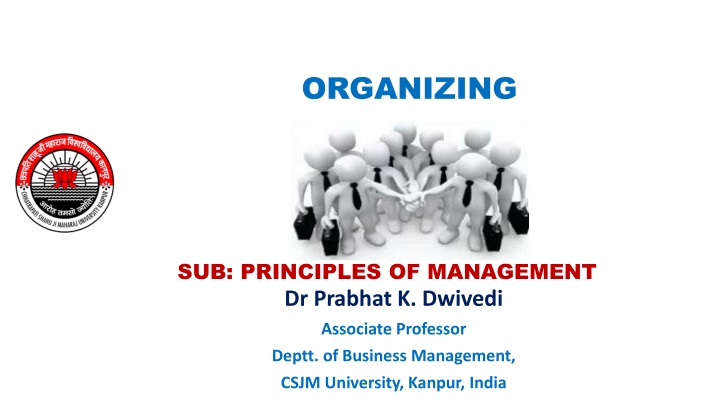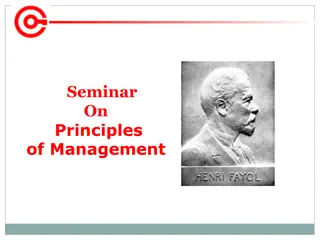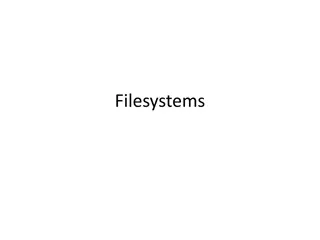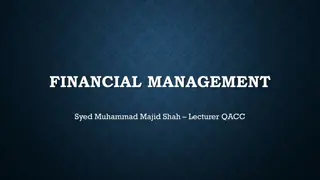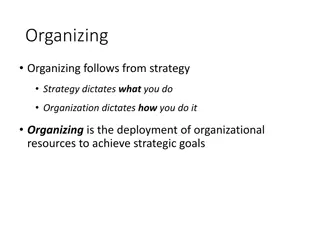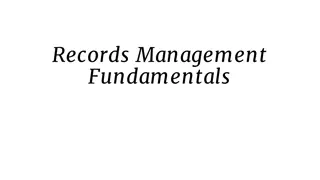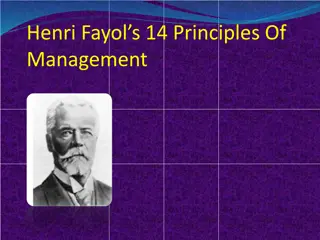Principles of Management - Organizing Fundamentals
The principles of management with a focus on organizing, including definitions, nature, characteristics, importance, formal and informal organization structures. Learn about the process of identifying, grouping work, delegating responsibilities, and establishing effective relationships to achieve objectives efficiently.
Download Presentation

Please find below an Image/Link to download the presentation.
The content on the website is provided AS IS for your information and personal use only. It may not be sold, licensed, or shared on other websites without obtaining consent from the author.If you encounter any issues during the download, it is possible that the publisher has removed the file from their server.
You are allowed to download the files provided on this website for personal or commercial use, subject to the condition that they are used lawfully. All files are the property of their respective owners.
The content on the website is provided AS IS for your information and personal use only. It may not be sold, licensed, or shared on other websites without obtaining consent from the author.
E N D
Presentation Transcript
ORGANIZING SUB: PRINCIPLES OF MANAGEMENT Dr Prabhat K. Dwivedi Associate Professor Deptt. of Business Management, CSJM University, Kanpur, India
Meaning Meaning Organize, verb gerund or present participle: organising 1. to plan or arrange an event, activity, etc. ( , ) The school organizes trips to various places of interest. The school organizes trips to various places of interest. 2. to put or arrange things into a system or logical order ;
Definition Definition According to Louis Allen: Organization is a process of identifying and grouping the work to be performed, defining and delegating responsibility and authority, and establishing relationships for the purpose of enabling people to work most effectively together in accomplishing objectives. According to Koontz and O'Donnell: "Organization involves the grouping of activities necessary to accomplish goals and plans, the assignment of these activities to appropriate departments and the provision of authority, delegation and co- ordination."
Nature or Characteristics Nature or Characteristics Division of Work Coordination Plurality of Persons Common Objectives Well-defined Authority and Responsibility Organization is a Structure of Relationship Organization is a Machine of Management Organization is a Universal Process Organization is a Dynamic Process
Importance or Advantages Importance or Advantages Increase In Managerial Efficiency Proper Utilization of Resources Sound Communication Possible Facilitates Coordination Increase in Specialization Helpful in Expansion
Formal & Informal Organization Formal & Informal Organization 1. Formal Organization: This is one which refers to a structure of well defined jobs each bearing a measure of authority and responsibility. It is a conscious determination by which people accomplish goals by adhering to the norms laid down by the structure. This kind of organization is an arbitrary set up in which each person is responsible for his performance. Formal organization has a formal set up to achieve pre- determined goals. 2. Informal Organization: It refers to a network of personal and social relationships which spontaneously originates within the formal set up. Informal organizations develop relationships which are built on likes, dislikes, feelings and emotions. Therefore, the network of social groups based on friendships can be called as informal organizations. There is no conscious effort made to have informal organization. It emerges from the formal organization and it is not based on any rules and regulations as in case of formal organization.
Relationship b/w Formal and Informal Organizations Relationship b/w Formal and Informal Organizations Formal Organizations Informal Organizations Formal Organization is an organization in which job of each member clearly defined, whose authority, responsibility and accountability fixed Informal Organization is formed within the formal organization as a network of the interpersonal relationship when people interact with each other. Formal organization originates from the set organizational structure informal organization originates from formal organization Formal organization can work independent Informal organization depends totally upon the formal organization. The formal organization is goal-oriented An informal organization, on the other hand, develops automatically and spontaneously. The behaviour of the members of the formal group is according to rules and regulations set by the management. The behaviour of the members of the informal group is according to the individual and group Interests. Focus on Work Performance Focus on Interpersonal relationship
Features of Formal Features of Formal organisation organisation The formal organisational structure is created intentionally by the process of organising. The purpose of formal organisation structure is achievement of organisational goal. In formal organisational structure each individual is assigned a specific job. In formal organisation every individual is assigned a fixed authority or decision-making power. Formal organisational structure results in creation of superior-subordinate relations. Formal organisational structure creates a scalar chain of communication in the organisation.
Advantages of Formal Advantages of Formal Organisation Organisation Systematic Working: Formal organisation structure results in systematic and smooth functioning of an organisation. Achievement of Organisational Objectives: Formal organisational structure is established to achieve organisational objectives. No Overlapping of Work: In formal organisation structure work is systematically divided among various departments and employees. So there is no chance of duplication or overlapping of work. Co-ordination: Formal organisational structure results in coordinating the activities of various departments. Creation of Chain of Command: Formal organisational structure clearly defines superior subordinate relationship, i.e., who reports to whom. More Emphasis on Work: Formal organisational structure lays more emphasis on work than interpersonal relations.
Disadvantages of Formal Disadvantages of Formal Organisation Organisation Delay in Action: While following scalar chain and chain of command actions get delayed in formal structure. Ignores Social Needs of Employees: Formal organisational structure does not give importance to psychological and social need of employees which may lead to demotivation of employees. Emphasis on Work Only: Formal organisational structure gives importance to work only; it ignores human relations, creativity, talents, etc.
Features of informal Features of informal organisation organisation Informal organisational structure gets created automatically without any intended efforts of managers. Informal organisational structure is formed by the employees to get psychological satisfaction. Informal organisational structure does not follow any fixed path of flow of authority or communication. Source of information cannot be known under informal structure as any person can communicate with anyone in the organisation. The existence of this organisational structure depends on formal organisation structure.
Advantages of Informal Advantages of Informal Organisation Organisation Fast Communication: Informal structure does not follow scalar chain so there can be faster spread of communication. Fulfills Social Needs: Informal communication gives due importance to psychological and social need of employees which motivate the employees. Correct Feedback: Through informal structure the top level managers can know the real feedback of employees on various policies and plans.
Disadvantages of Informal Disadvantages of Informal organisation Spread Rumours: According to a survey 70% of information spread through informal organisational structure are rumours which may mislead the employees. No Systematic Working: Informal structure does not form a structure for smooth working of an organisation. May Bring Negative Results: If informal organisation opposes the policies and changes of management, then it becomes very difficult to implement them in organisation. More Emphasis to Individual Interest: Informal structure gives more importance to satisfaction of individual interest as compared to organisational interest. organisation
